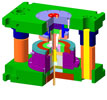
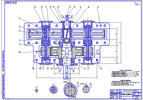

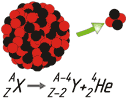

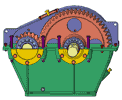
Rimoyt.com
Темы: машиностроение, САПР, 3d моделирование, техническое образование, промышленные предприятия, технические вузы

Народная мудрость
English version mini. Notes on various topics
noosphere and socialism (cosmism), and not the digital Middle Ages (or simply the Middle Ages)
 |
The city of the future is a city with a lot of trees. American city building experience is unsuccessful It is necessary to increase the number of trees (and flowering - apple trees, cherries) in cities, to limit the scene for wireless technology. Empty / artificial volumetric information (entertaining media files) negatively changes the ether, air. |
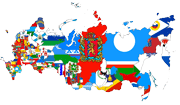 |
Russian Federation - Multinational country. Many nations live here (as in Europe). The total area of Russia is 17,075,400 square kilometers (N1 in the world). As elsewhere, there are bad people, good and neutral. Russia - mini-world, Europe + Asia = EurAsia = Russia (not Rusland). religion and nation Orthodox Christianity is the most common religion among the peoples of Russia. The Holy Book of Orthodox Christians - the Bible. Another religion in Russia is Islam (Tatars, Bashkirs, Kabardins, Chechens), Judaism, Buddhism (Kalmyks, Buryats, Tuvans), non-traditional religions. Russians ("русские") are the nation of Russia. "Rossians" ("россияне") - all nations of Russia (Russians, Tatars, Jews, Udmurts, Armenians, Bashkirs, Buryats, Ingush, Yakuts, etc.). In English there is no word "Rossiyanin/Rossians", only "Russian". Briefly: Largest cities - Moscow (12 mln), Saint Petersburg (5 mln), Novosibirsk (1,5 mln) Russian food - borscht, cabbage soup, meat dumplings, jellied meat, herring under a fur coat, buckwheat, okroshka, solyanka, squash caviar. Resources - water, oil, gas, wood, gold, coal, iron ore Science - Lomonosov, Mendeleev, Lobachevsky, Vernadsky, Tsiolkovski Culture - Pushkin, Lermontov, Turgenev, Dostoevsky Interesting places - Lake Baikal, Kamchatka, southern Russia (resorts of the Krasnodar Territory) |
  |
Energy is interdependent on both time and space (by some formula with E, V, t). The energy of any part of space (area) changes over time. Human energy is also changing. - Reference systems exist for all people. These are the systems around which a person’s life revolves. In childhood, the most powerful impact is exerted by the yard (where he lives), the school, then the institute, work, family. If a person has the opportunity, it is necessary to maximize their number so as not to become locked in one System, especially if this System has a negative effect When communicating, people exchange energy, which in terms of impact can be positive (friendly meeting), negative (quarrel), neutral (business communication, background information). Energy is consumed over time and needs to be received again. * In many countries, company management prohibits negotiations at work, so managers block the exchange of energy between people and try to make them similar to robots. - Primary energy is zero - The ideal source of energy is the hamster. Hamster spins wheels and generates energy. He must spend less money on food than he produces energy. The dream of the capitalist. Joke. - The energy that a person receives from food and from communication is different. There are many types of energy. - The problem for a person is not to live in "his (general) time." On the other hand, it is these people who usually change the situation (time) for better or worse. All people have "their own time" - their characters are associated with this - if it coincides with the current "total time" (where they live), then they are comfortable.The problem for a person is not to live in "his (general) time." On the other hand, it is these people who usually change the situation (time) for better or worse. All people have "their own time" - their characters are associated with this - if it coincides with the current "total time" (where they live), then they are comfortable. - For a person, time goes slower than, for example, for an ant. This is similar to the fact that for higher beings it is a short time, but for a person it is a whole life. - Time is not simpler than space, because if we do not know exactly how to create space, then creating time is even more incomprehensible. Ie space is not more complicated, because it is not clear how to create time - There is a digitalization of all the present. Further, they may try to digitalize time, events, that is, feelings, sensations. On their basis, create needs (or dependencies), manage sensations. Of course, everything will be used in the entertainment industry. But can also be used to replace memories, change memory, etc.? |
| The microworld is often similar to the macrocosm. The arrangement of an atom and molecule is somewhat similar to the arrangement of the solar and other systems and the arrangement of planets. We cannot say where the beginning is at the Earth and where the end is - the universe can also be. - The microworld is often similar to the macrocosm. The structure of the atom and molecules is somewhat similar to the structure of the planets / solar and other systems. - A person may not understand the devices of the universes, but the ant also does not understand the structure of the Earth (and the person also does not yet understand) - The solar system is an organism (being), the Earth is also an organism, only at different levels. Comparing planets and systems with atoms and molecules is logical, because there are some similarities, for example: electrons are satellites, planets are atoms, the solar system is a molecule (the sun is an atom). That is, the microworld and the macrocosm are similar - On Earth in one place day, in another at the same time - night. They replace each other (time - cycles), the end of the night is the beginning of the day and vice versa (development and degradation can also replace each other). The Universe may have the same time cycles. - The universe is expanding and narrowing - there may be cycles of "breathing" |
 |
- artificial reality in the simplest form of games has already been created. There is a possibility that short, but interesting stories can be more popular than created artificial worlds in which there is nothing to do. - some will create in the future the laws of artificial worlds (mathematicians and physicists, philosophers, engineers), others - the appearance of the worlds (architects, designers, musicians) and "avatar characters". Screenwriters will come up with a plot and interesting activities. - worlds can be made both in realistic and in some cartoon styles, and it is not known what will be more popular - Theoretically, virtual reality could become more popular than many real entertainments. But now, the higher the capabilities of computers, the less people can come up with, even through the efforts of large teams. Virtual worlds seem empty and actually artificial, in contrast to the imperfect real world. - On the one hand, with the complete digitization of spaces (life), a person can be anywhere on the planet without leaving home. On the other hand, because of this, the atmosphere of the planet can change strongly and negatively. - ????(??????)??????,??,???????????? With a good imagination, people could imagine all this. While there was an effect of novelty and interest, there was also a maximum effect of immersion in this artificial world (the world of books, films, games). |
   |
Already now you can create a robot that “knows a lot” and can move wisely, write down a lot of topics for him to talk so that he can communicate with different behaviors. You can constantly replenish the data of the robot (android) and educate it. But the feeling that this is a robot, and not a person will be at everyone. Over time, for the robot (android) it will be possible to record even all kinds of emotions, all behaviors depending on his character / mentality, but what will it give to the person? - In the Middle Ages and earlier (Ancient Rome and earlier), people did not have robots. Those who seized power among people tried in every possible way to use the rest as servants and slaves. What kind of development of the world in such conditions could be discussed? - With the creation of androids, there is still a lot of incomprehensible. Robotics competes with the development of virtual reality technologies, which, in principle, is simpler. Therefore, it is also possible to abandon the development of the direction of "robotics" for some time due to the complexity of projects. - similarity - a person and a robot (computer) get tired, they periodically need rest ("sleep"), energy (electricity / food), if something works badly, they need repair. There are similarities in the memory device - short memory in people and on the hard drive, long memory - in the "cloud". Over time (with age), human consciousness changes (evolution or vice versa), the consciousness of android robots can also change, after reprogramming - the more robots now work in companies, the fewer people are needed (ideally, only for their maintenance), but the fewer people work, the less people will buy goods and services. if they don't even have “compulsory income” (if they have, they will have completely different problems), the sooner and sooner people will become unhappy with the situation. This also contributes to the crisis of production and trade. Perhaps the introduction of the rental system in many industries and with it stagnation (not development), like the stagnation of the medieval period. But the development of robotics can be moderate and in a completely different way. - Someday, artificial intelligence, or rather several of them, will be created by the efforts of many people at different times. A part can become hostile (if we take an example from people in relation to people and other creatures) both in relation to other artificial intelligences and in relation to people, part - not. - Cyborgs, in principle, already exist, people already install various inserts for themselves, even silicone ones. But in many cases this is not necessary - for lifting weights, for example, it is better to wear an exoskeleton or special gloves than to implant in your body. Even a hat with a projector is better than a helmet worn on the head or worse - an implantable and uncontrollable chip. - Over time, the “reprogramming” of the android (evolution, or a change in the model) can be made - as if a person immediately finished university after school (or vice versa). |
 |
- Power - those who received it are trying to maintain and increase it, right up to the outbreak of world wars. In the future, can something change and improve in a peaceful direction with the widespread introduction of modeling tools for the future and artificial, mainly rational, mind? Most likely, no, just as always, elites first assess their risks and allies before deciding on a war and, if there are no threats to them, then proceed to active actions. And, in the same way they will act in the future - similar to elites of all time. - Ideological groups are usually at least two (some, for example, represent the "real" economy - industry, others - "virtual" - banks, IT). At their level, they are like rivals (but mega-regulators that determine the outcome of elections in many countries can still stand above them). And they all strive to change Time in their direction, they are closely connected with elite groups (generally speaking they are built into them). together they prepare situations (arrange provocations, taking advantage of contradictions in society, deliberately worsen the economic situation in countries) for coming to power, if they have less power than their competitors. - Methods of retaining power (for many, power and money is the main motivation for activity, often destructive) - some use trickery (hidden control), others use aggression (direct control was used more often before). - The current government in the world extracts all the resources of the Earth. If resources run out, then they begin to return people to the Middle Ages (the upper level of Power transfers their ideas to all segments of the population). For a long time, people will not be able to search for energy sources on other planets. limiting the extraction of resources does not ensure the further development of mankind. If there is no Intelligent Development, then the world government will continue its ideology, which is unreasonable. - The leadership of the countries or the world government does not need many companies, but they are supported in order to maintain their power. This is not so bad, because the leaders themselves (shadow shareholders / oligarchs are usually the main perpetrators of losses for companies), these companies need even less. And they can remain with money and power even in the event of the bankruptcy of a company / organization / region. |
Are there 7 levels of knowledge at the end of which a person will go out into space, will be able to view time and / or create his own reality? - If only the presence of the ability for the creative process distinguishes a person from a robot, then a high proportion of people are robots? - What gives people the creation of artificial people? - What will happen to the population of the Earth in overpopulated areas who do not want to participate in wars for the interests of others? - Would you like to invent, do, invent, assuming that others will then use it without even knowing about you, someone will even try to make money on it and pass off your invention as its invention? - Does a person have to ensure continuous development so as not to roll back or just exist? Probably the first. - Looking through old information, a person indulges in memories. - There are other people's memories that are common to a group of people. Will there be differences between people in countries with similar living standards, but different cultures, religions? |